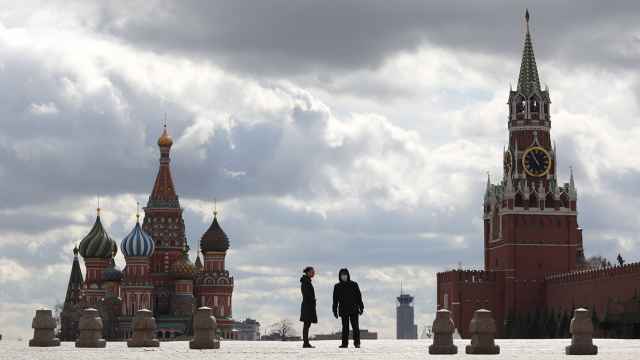As the U.S. begins bilateral negotiations with Russia over Ukraine, the threat of tougher sanctions is widely seen as President Donald Trump’s greatest leverage. Speaking at the Munich Security Conference on Feb. 15, Trump’s special envoy for Ukraine and Russia, Keith Kellogg, said the U.S. could "employ sanctions that break the economy’s back" by depriving Russia of oil revenues to pressure Putin into concessions. Kellogg rated the severity of current sanctions against Russia a "6 out of 10" and their enforcement a "3 out of 10," indicating plenty of room to tighten the screws.
He is not alone in his optimism. There is a widespread expectation that Trump will be better at bullying Russia economically than the Biden administration if he chooses to do so. The implicit assumption is that the Biden administration was soft on Moscow.
But as Trump and his team are about to find out, increasing sanctions pressure on Russia is easier said than done. Any effort to ratchet up sanctions pressure will be hampered by the same laws of economics and global trade that have made it so difficult for the U.S. and its allies to use sanctions more effectively in the past. Trump’s unilateralism, disregard for the Western alliance, and impulsive style will make it even harder for him to use sanctions effectively.
It is true that Russia’s economy is not in great shape and the war comes at increasingly high costs, which could make Russia vulnerable. It is facing an acute labor shortage, as the war and the military industry are drawing in hundreds of thousands of workers. Huge public spending on the war has led to persistent inflation. For over a year, the Central Bank has been trying to control it with very high interest rates — so far to no avail. While the budget deficit is not threatening at 2% of GDP, Russia’s National Welfare Fund is about to run out of liquid assets, forcing the government to borrow more. In recent months, the ruble exchange rate and Russian financial markets have been very volatile.
Russia is also struggling with Biden’s "farewell package" of sanctions, introduced on Jan. 10, with tough new measures on Russian energy. By designating over 160 ships of the so-called shadow fleet that transported Russian oil, the U.S. has created a serious problem for Russia’s main export routes. Washington also for the first time blacklisted two very large Russian energy producers — Gazpromneft and Surgutneftegas. The full impact of these measures is only gradually unfolding and could cause some serious problems for Russian oil exports.
Still, Russia’s overall economic situation is far from critical. Inflation is certainly a concern for Putin. But at this point, it is not urgent enough to be a factor in negotiations. If anything, the threat of more sanctions is much weaker today than it was on the eve of the full-scale invasion.
There is also a reason why Biden’s boldest sanctions package on Russian energy came so late: sanctioning Russian oil is very risky for the White House. If successful, the farewell package will reduce Russian oil export volumes. The problem is that fewer Russian exports means less oil supply on world markets. This, in turn, could lead to higher global oil prices. In the end, American consumers will feel the success of sanctions on Russia at their local gas station, which stands in stark contradiction to Trump’s promise of fighting U.S. inflation by lowering energy costs. The G7 price cap on Russian oil was supposed to solve this dilemma by keeping the world market supplied while lowering Russian revenues. But there are simply too many ways of circumventing it, and effective enforcement of the cap has remained elusive.
To "break the back" of Putin’s economy, as General Kellogg put it, sanctions would have to go much further than Biden’s January 10th package: They would have to block most of Russian oil exports. In principle, the U.S. has the tools to do just that. For example, it could introduce an Iran-style oil embargo, threatening secondary sanctions against buyers of Russian oil. But unless other arrangements are made, it would throw global energy markets into disarray.
Russian oil exports can only be targeted effectively if other oil producers step in to compensate for the lost supply. The only country that has enough spare capacity to fill that role today is Saudi Arabia. However, while the Saudis fought a fierce oil price war with Russia in 2020 and might be looking to expand their market share, they will hardly be interested in helping Trump to sanction Russia more. Doing so would not only jeopardize their new role as a mediator but also burn down the OPEC+ alliance they have relied on in past years.
This does not mean that additional sanctions are impossible. There are still a few smaller options outside of oil that would hurt Russia and could be implemented — even in the short term.
One obvious example would be targeting Russian liquefied natural gas (LNG). The U.S. has already virtually shut down one big Russian LNG project, Arctic LNG 2, before it ever came into operation. It could probably do the same to Russia’s other big LNG project, Yamal LNG, which exports around 20 million tons of LNG per year. At current gas prices in Europe that comes close to $15 billion in annual export revenue.
From Washington’s point of view, sanctioning LNG has the advantage that it helps the numerous new American LNG suppliers that have sprung up to find additional customers in Europe. The U.S. could also decide to go after other Russian exports such as fertilizer, which so far has been spared from sanctions and is one of the main imports from Russia to the U.S.
Other than that, there are very few low-hanging fruits left. Those that remain are becoming increasingly small: U.S. imports of Russian fertilizer stand at just $1.3 billion. Meanwhile, total Russian exports (of all goods and services) are around $460 billion per year.
To pressure Putin with sanctions effectively, Trump would need three things: first, he would have to realize that the issue is complex and rely on the full sanctioning competence that was built up in the U.S. Treasury over the last few years. Second, he would have to renew the sanctions coalition with U.S. allies in the G7 and also coordinate with major oil producers, especially Saudi Arabia, which will require a significant diplomatic effort. Third, he would need patience, because even if everything works as planned, the back of Russia’s economy will not break in a week — or a month.
Even if Trump wanted to toughen sanctions, it is hard to imagine that he could assemble the coalition necessary to implement any that would be tough enough to make a difference in the negotiations on Ukraine. His desire for a quick result also makes it unlikely that the U.S. government will have the stamina to use sanctions effectively against Russia.
A Message from The Moscow Times:
Dear readers,
We are facing unprecedented challenges. Russia's Prosecutor General's Office has designated The Moscow Times as an "undesirable" organization, criminalizing our work and putting our staff at risk of prosecution. This follows our earlier unjust labeling as a "foreign agent."
These actions are direct attempts to silence independent journalism in Russia. The authorities claim our work "discredits the decisions of the Russian leadership." We see things differently: we strive to provide accurate, unbiased reporting on Russia.
We, the journalists of The Moscow Times, refuse to be silenced. But to continue our work, we need your help.
Your support, no matter how small, makes a world of difference. If you can, please support us monthly starting from just $2. It's quick to set up, and every contribution makes a significant impact.
By supporting The Moscow Times, you're defending open, independent journalism in the face of repression. Thank you for standing with us.
Remind me later.








